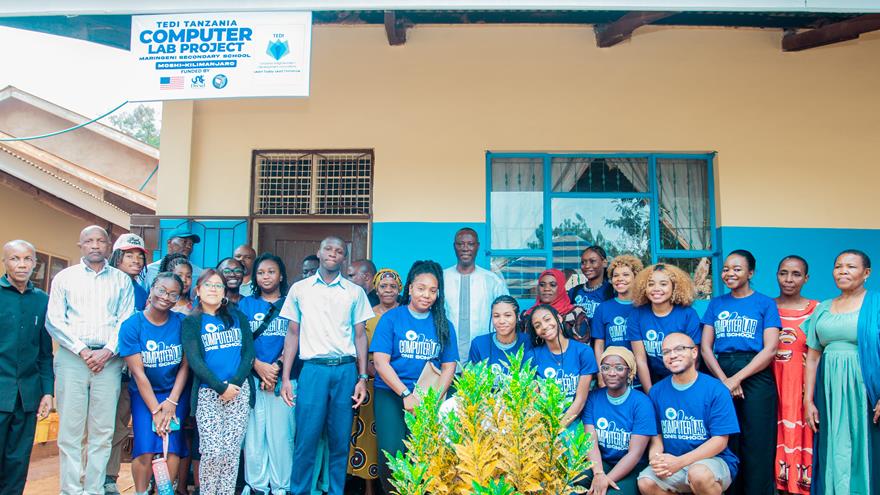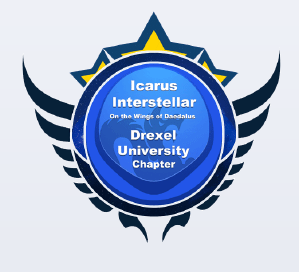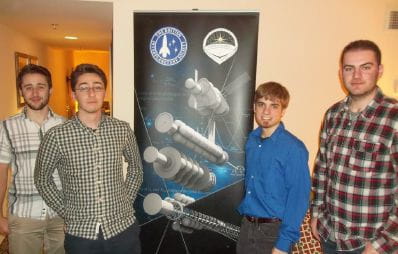Drexel Icarus Interstellar Sets Sights on Local Starship Congress—and Interstellar Travel

- Through Connections and Community, Drexel Course Helps Launch Computer Lab in Tanzania
- Drexel's Self-Heating Concrete Is One Step Closer to Clearing Sidewalks Without Shoveling or Salting
- Splunk Founder Michael Baum ’85 Shares Personal Philosophies, Entrepreneurial Advice and the Impact of His Drexel Co-ops
- Pinging Pipes Could Help to Identify Lead Water Lines Without Excavation

Drexel’s Icarus Interstellar students move fast — something key to their goal of exploring new solar systems.
In three years, Drexel students have started the first collegiate chapter of Icarus Interstellar, increased the club size from five to over 60 students, and will host the international nonprofit’s 2015 Starship Congress Sept. 4 and 5. Impressive, yes, but that’s just the beginning for the chapter of a group aiming to travel to star systems beyond our own solar system by 2100.
Drexel’s distinction as the first student chapter made it a clear choice to host the organization’s biennial international assemblage of notable interstellar and deep space scientists and proponents.
Since only one other student chapter, from the University of Miami, has been created since Damien Turchi founded Drexel’s group in 2013, Turchi and other Icarus members hope the meeting will inspire students across the country to form their own chapters.
“It is essential for students to be involved in developing the future of interstellar engineering. Exposing students to this is a very powerful tool to ensure that the up-and-coming generation views interstellar travel as something doable, and not completely bounded to science-fiction,” said Turchi, who will graduate in 2016 with bachelor’s and master’s degrees in mechanical engineering.
By that view, Drexel students are already light-years ahead of their peers.

The students have been working on propulsion designs of CubeSats, tiny cube-shaped research spacecraft nanosatellites designed as part of Icarus’s Project Tin Tin, which aims to build the first-ever mission to Alpha Centauri. Though it’s the closest star system to our solar system, no mission has ever been attempted.
In fact, mankind’s only mission that could reach a neighboring solar system, the Voyager, will take tens of thousands of years after being launched into space in 1977.
One of the posters Drexel students will present at the conference focuses on experimental use of a field emission electric propulsion system. Most of that research was completed by sophomore mechanical engineering major Noah Alessi during his tenure in the Office of Undergraduate Research’s STAR (Students Tackling Advanced Research) Scholars Program.
Members of the Drexel chapter hope that this propulsion system will be used on the Project Tin Tin CubeSat.
The chapter will also present a visual simulation of a fusion propulsion system, an overview of a theoretically designed spacecraft by Drexel students and a presentation of Drexel's RASC-AL project. The RASC-AL project was entered into the national architecture engineering design competition this past academic year.
Two Drexel students will also speak at the conference. Turchi will discuss the importance of Icarus student chapters expanding throughout the world. Mechanical engineering major David Evinshteyn will highlight the Drexel chapter’s theoretically-designed interstellar spacecraft Zeus, which uses a Plasma Jet Magneto Inertial Fusio
n (PJMIF) propulsion system. The design is ongoing and has been a collaboration of almost the entire student chapter.
Beside demonstrating their own work, Drexel students will have the chance to network with fellow Icarus members and aerospace professionals from around the world. Notable attendees will include Harold “Sunny” White, PhD, Advanced Propulsion team lead for the NASA Engineering Directorate, and TED fellow Rachel Armstrong, a sustainability innovator.

Many chapter members and the organization’s faculty advisor Ajmal Yousuff, an associate professor in the College of Engineering, have contributed to organizing this event.
The work of all Drexel Icarus students, whether organizing or presenting or networking at the conference, will be vital to advocating the development at more student chapters.
“I’m hoping to challenge those in attendance to create student chapters of Icarus Interstellar at the universities where they are either coming from or have attended,” Turchi said. “Hopefully, we will eventually become for interstellar engineers what the American Institute of Aeronatuics and Astronautics (AIAA) is for aerospace engineers.”
In This Article
Drexel News is produced by
University Marketing and Communications.
